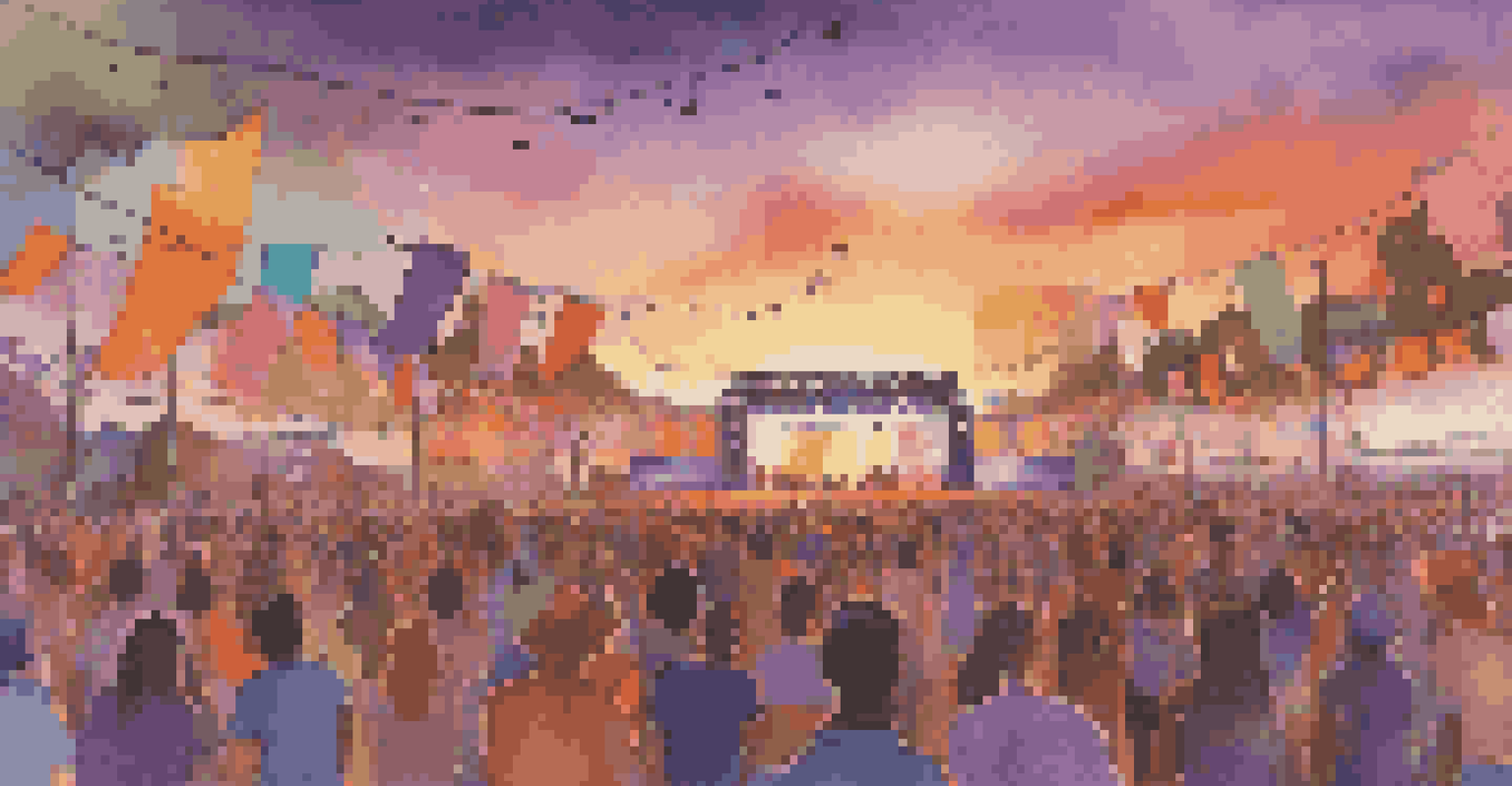The Role of Music in Reflecting and Shaping Cultural Attitudes

How Music Mirrors Cultural Identity and Values
Music often serves as a powerful mirror to cultural identity, showcasing values, beliefs, and traditions. For example, traditional folk music reflects the stories and struggles of communities, preserving their history and heritage. This connection helps individuals feel a sense of belonging, as they identify with the themes and lyrics that resonate with their experiences.
Music is the shorthand of emotion.
In contemporary settings, genres like hip-hop or reggae can express cultural nuances and social issues, providing a voice to marginalized groups. These musical forms often highlight struggles for rights and recognition, bridging the gap between generations and fostering a shared understanding. As listeners embrace these sounds, they connect with their cultural roots and gain insights into others’ experiences.
Moreover, music can lead to cultural evolution, as new influences emerge and blend with traditional styles. This dynamic process not only enriches cultural identity but also encourages dialogue and collaboration between diverse communities. Thus, music becomes a living testament to the ongoing story of cultural identity.
The Influence of Music on Social Movements
Throughout history, music has played a crucial role in social movements, acting as both a rallying cry and a source of inspiration. Songs like 'We Shall Overcome' became anthems for the Civil Rights Movement, uniting individuals in their fight for equality. This collective experience fosters solidarity, reminding participants of their shared goals and aspirations.

In modern times, artists continue to use their platforms to address pressing social issues. For instance, songs addressing climate change or systemic racism resonate with listeners, sparking conversations and motivating action. These musical expressions not only raise awareness but also empower individuals to take a stand and demand change.
Music Reflects Cultural Identity
Music serves as a mirror to cultural identity, showcasing values, beliefs, and traditions that foster a sense of belonging.
Ultimately, music has the power to transcend barriers, connecting people across different backgrounds and experiences. By harnessing this influence, movements can inspire a wider audience, turning individual emotions into collective action. This demonstrates music's unique ability to shape cultural attitudes and propel social change.
How Genres Reflect Societal Changes and Attitudes
Various music genres emerge and evolve in response to societal changes, reflecting the attitudes and values of the time. For example, the rise of punk rock in the 1970s mirrored a growing discontent with mainstream culture and politics. This genre’s raw energy and rebellious spirit resonated with youth seeking to challenge the status quo.
Without music, life would be a mistake.
Similarly, the emergence of electronic dance music (EDM) in the 1990s highlighted a shift towards individualism and escapism in urban settings. As people sought connection and joy through communal experiences in clubs and festivals, EDM provided an outlet for expression and celebration. This evolution illustrates how music can adapt to and influence societal attitudes.
As trends continue to change, genres like country or pop also reflect shifts in values, addressing themes of love, heartbreak, and resilience. By examining the evolution of these genres, we gain insight into the cultural landscape and the collective consciousness of society at any given moment.
Music as a Tool for Cultural Preservation
Music plays a vital role in preserving cultural heritage, allowing traditions to be passed down through generations. For instance, indigenous music often incorporates ancient instruments and storytelling techniques that encapsulate a community's history and values. By keeping these traditions alive, music helps maintain a sense of identity and continuity.
In many cultures, rituals and celebrations are accompanied by specific musical forms, reinforcing social bonds and cultural practices. For example, wedding songs or harvest tunes serve not only as entertainment but also as expressions of shared beliefs and communal experiences. This integration of music into cultural events strengthens the ties that bind communities together.
Music Fuels Social Movements
Throughout history, music has inspired social movements, acting as a rallying cry that unites individuals in their fight for change.
Moreover, the revival of traditional music genres in contemporary settings demonstrates a growing appreciation for cultural roots. Artists are increasingly blending modern sounds with traditional elements, creating a fusion that appeals to new audiences while honoring their heritage. This synergy ensures that cultural narratives remain relevant and vibrant.
The Role of Technology in Shaping Musical Expression
Advancements in technology have significantly influenced how music is created, distributed, and consumed, impacting cultural attitudes along the way. The rise of digital platforms has democratized music production, allowing aspiring artists from diverse backgrounds to share their stories and sounds. This accessibility fosters a rich tapestry of musical expression that reflects a multitude of cultural perspectives.
Furthermore, social media has transformed the way music is promoted and experienced, creating communities around shared interests. Viral trends can propel lesser-known artists into the spotlight, highlighting cultural diversity and sparking new conversations. This interconnectedness enables listeners to explore music from different cultures, broadening their understanding and appreciation of global sounds.
However, the rapid pace of technological change can also lead to challenges, such as the commercialization of music and the dilution of cultural authenticity. As artists navigate this landscape, striking a balance between innovation and preserving their cultural roots becomes essential. Ultimately, technology's role in music continues to shape cultural attitudes, both positively and negatively.
The Emotional Power of Music in Shaping Attitudes
Music possesses a unique ability to evoke emotions and shape attitudes, often serving as a soundtrack to our lives. For instance, a powerful ballad can stir feelings of nostalgia, grief, or joy, connecting listeners to their personal experiences. This emotional resonance allows music to influence how we perceive our surroundings and interact with others.
Moreover, music can create a sense of unity and belonging, as shared musical experiences foster connections among people. Concerts, festivals, and communal listening sessions provide opportunities for individuals to bond over their love for a particular artist or genre. These moments of togetherness can strengthen cultural ties and encourage positive attitudes toward diversity and acceptance.
Technology Shapes Musical Expression
Advancements in technology have transformed music creation and distribution, allowing diverse voices to share their cultural stories.
Additionally, the therapeutic benefits of music highlight its impact on mental well-being and societal attitudes. Research has shown that music can reduce stress, alleviate anxiety, and enhance mood. By promoting emotional healing, music helps cultivate a more compassionate and interconnected society, reflecting a collective desire for understanding and empathy.
The Future of Music as a Cultural Reflection
As we look to the future, the role of music in reflecting and shaping cultural attitudes will continue to evolve. With globalization and the blending of cultures, we may see new genres and musical forms emerge, reflecting a more interconnected world. This evolution has the potential to foster greater understanding and appreciation for diverse cultural expressions.
Moreover, as societal issues such as climate change and social justice become more prominent, musicians will likely use their art to raise awareness and inspire change. The power of music to mobilize communities and create movements will remain a vital force in shaping cultural attitudes and driving social progress.

Ultimately, the future of music is bright, as it continues to serve as a platform for dialogue, expression, and connection. By embracing the diverse sounds and stories that music offers, we can cultivate a richer cultural landscape that celebrates our shared humanity.